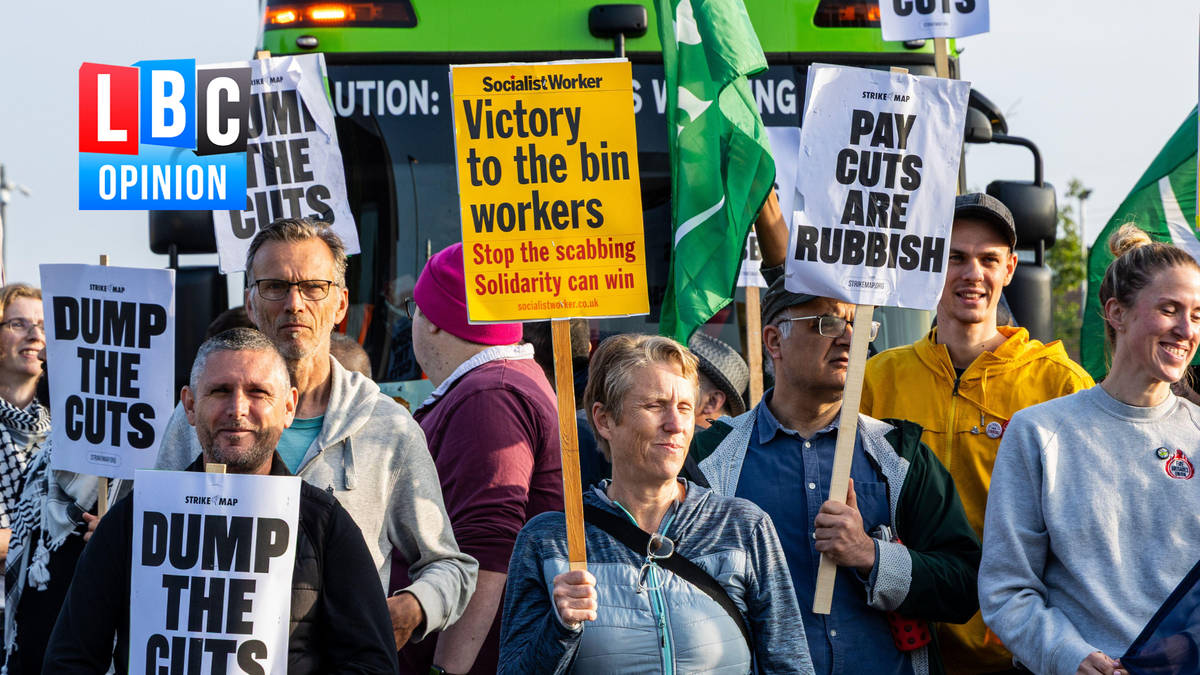26 July 2025, 14:25 | Updated: 26 July 2025, 14:57
Around 150 trade unionists gathered to show solidarity with the Brum bin workers at the picket line at Perry Barr Waste Depot near Birmingham as part of the Birmingham Bin Strike.
Picture:
Alamy
There’s a big difference between demanding a pay rise and fighting to protect your pay.
Outside of Spaghetti Junction, time doesn’t move any slower in Birmingham than anywhere else in the UK, but it’s felt like a very long year in the second city.
More than four months of all-out strike action by bin workers (who had been walking out intermittently for nearly four months before that), weeks without a bin collection for countless Brummies, months of nose-wrinkling at the mountainous cairns of black bags and fly tipping which marked every back street junction It was interminable for many and unacceptable for the rest.
I’m one of the reporters who’s been doing a fair bit of nose-wrinkling while covering the strike and, frankly, wishing at times I was anywhere else.
So why do I sympathise so strongly with the bin workers who’ve seemingly caused all this? The short answer is that I couldn’t survive an £8,000 pay cut. Could you?
That’s what some bin workers are facing, in light of proposed cuts by the City Council, if they were to give up and go back to work.
Until I spoke to striking bin workers on a picket line outside a depot, I assumed most people did the job because they couldn’t do anything else.
I can’t be the only person who’s held or holds that view, but it just isn’t true. Many bin workers love what they do and speak passionately and articulately about the job in a way that many supposedly skilled office workers with impressive CVs cannot.
One worker has on more than one occasion shown me “commendations” he has received. These commendations aren’t emails from the boss with their boss CC’d.
They’re posts and messages from real people on community pages on social media – and they mean the world to him.
He doesn’t want a pay rise. He wants to be paid the same wage next year as he was last: the same pay for the same job.
We noticed when they weren’t doing their job. The world’s media noticed. An invisible workforce was suddenly all too visible – as was, at times, the Scooby-Doo-esque green lines wafting from the rubbish they weren’t collecting. Yet their work goes unnoticed.
Doctors probably feel we take them for granted, too. The fact that junior doctors would rather be called “resident doctors” suggests a real fear of being deemed somehow underqualified.
They have more valid grievances than that. Years of below-inflation pay increases have driven many doctors abroad and left others feeling undervalued.
No one has threatened them with a pay cut, though. They’ve had the highest pay rise in the public sector for two years in a row. Yet resident doctors are going on strike again for five days, like a reasonably well-fed Oliver Twist asking for some more.
I want to set up a conversation between a striking doctor and a striking bin worker: a chance for both to listen to one another. I’m willing to be proven wrong, but I think, outside of a hospital or medical school, the doctor would come away having learned far more than the bin worker.
________________
LBC Opinion provides a platform for diverse opinions on current affairs and matters of public interest.
The views expressed are those of the authors and do not necessarily reflect the official LBC position.
To contact us email opinion@lbc.co.uk
